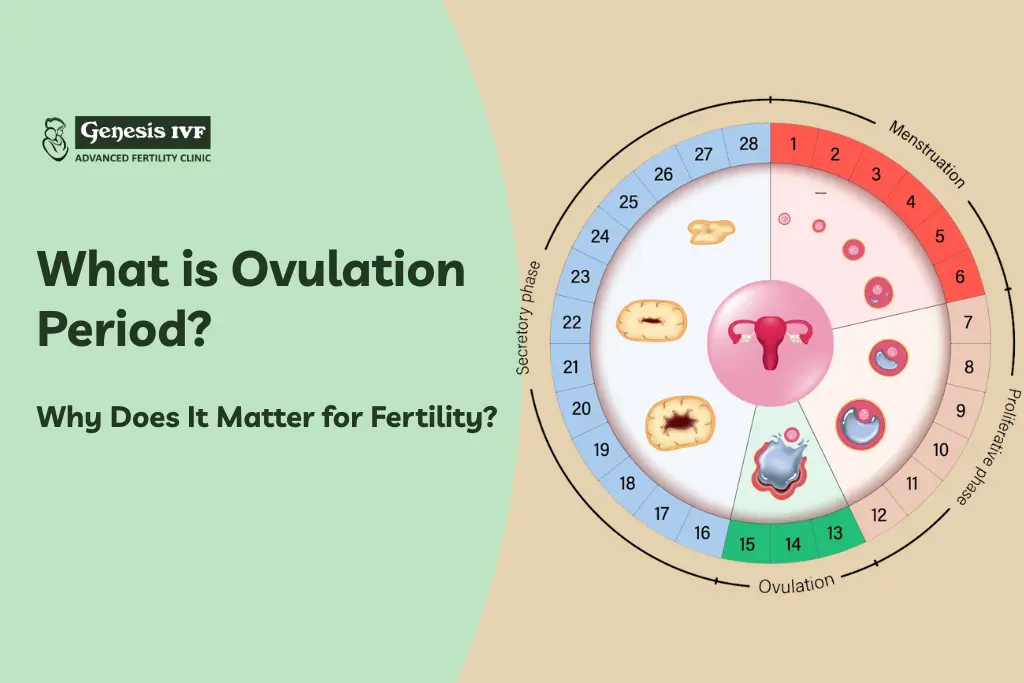When couples begin their fertility journey, one of the most common questions is what is ovulation period is and why it plays such a crucial role in conception. At clinics like Genesis IVF, doctors often guide couples to understand their ovulation cycle first, since timing intercourse or treatments around this window can significantly improve pregnancy chances.
Timing is everything when it comes to conception. Understanding your ovulation period can greatly increase your chances of becoming pregnant.
Understanding Ovulation Period
Ovulation is a natural process in which a mature egg is released from the ovary into the fallopian tube, waiting for sperm to fertilize it. This phase is called the ovulation phase, and it is considered the most fertile time in a woman’s menstrual cycle.
In simple terms, ovulating meaning releasing an egg that is ready to be fertilized. Once released, the egg typically survives for about 12 to 24 hours. This is why couples need to focus on timing, because how long does ovulation last is very short. Fortunately, sperm can live for 3–5 days inside the female reproductive tract, which extends the fertile window beyond just the day of ovulation.
Ovulation in a 30-Day Menstrual Cycle
In a standard 30 days menstrual cycle ovulation usually takes place around the middle, between days 14 and 16. However, every woman’s cycle is different, and ovulation can shift depending on hormones, health, and lifestyle.
- Day 1–5: Menstruation phase, bleeding occurs.
- Day 6–13: Follicular phase, when follicles develop in the ovaries.
- Day 14–16: Ovulation, this is when does ovulation occur, where the egg is released.
- Day 17–30: Luteal phase, where the body prepares for implantation or the next cycle.
For women wondering how many days after your period do you ovulate, the answer depends on their cycle length. In a 30-day cycle, ovulation generally happens about two weeks after the start of your period.
Why Does the Ovulation Time Period Matter for Fertility?
The Fertile Window
The short ovulation window is the most critical time for conception. To maximize chances, couples are often advised to have sex 2 days before ovulation and on the day itself. Since sperm survive longer than the egg, having intercourse slightly before ovulation ensures sperm are present when the egg is released.
This also answers how many days before ovulation can you get pregnant. The most fertile days are 2–3 days before and including ovulation day.
Ovulation and Pregnancy Connection
The close relationship between ovulation and pregnancy cannot be overstated. Without ovulation, conception is impossible. A missed ovulation, irregular cycles, or hormonal imbalances can all lead to infertility issues. That is why tracking ovulation is vital for couples trying to conceive naturally.
When fertilization occurs, the result is ovulation pregnancy, but if fertilization doesn’t happen, the egg is shed with the next menstrual cycle.
Challenges with Irregular Ovulation
Not all women have regular 28–30 day cycles. Stress, PCOS, thyroid imbalances, weight fluctuations, and certain medical conditions can cause irregular ovulation. In such cases, pinpointing when does ovulation occur becomes difficult, reducing chances of natural conception.
For women who struggle with irregular cycles, medical support can help identify the fertile window. Fertility specialists often use ultrasounds, hormone tests, and advanced methods to time ovulation more accurately.
Medical Support for Ovulation and Fertility
When natural timing isn’t enough, fertility treatments step in to support conception by working hand-in-hand with your natural ovulation phase. At Genesis IVF, advanced reproductive techniques are designed to align with ovulation and maximize success:
- During IVF egg pick up, eggs are retrieved from the ovaries after stimulation, carefully timed around ovulation.
- Women who want to delay pregnancy but preserve fertility can choose Egg Freezing, storing eggs for use in a future cycle when ovulation occurs.
- Male partners can also preserve fertility through Sperm Freezing, ensuring viable sperm are available at the right ovulation time.
- For those undergoing IVF, Blastocyst Culture and Embryo Transfer ensures that embryos are placed back into the uterus at the most receptive stage, synchronizing with the ovulation and implantation window.
These treatments are particularly beneficial for couples facing ovulation disorders, male infertility, or unexplained infertility.
Tips for Tracking Ovulation Naturally
Even without medical support, women can improve their awareness of ovulation through simple methods:
- Cervical mucus observation: Around ovulation, mucus becomes clear, slippery, and stretchy like egg whites.
- Basal body temperature charting: A Slight rise in body temperature indicates ovulation has occurred.
- Ovulation predictor kits (OPKs): These detect the luteinizing hormone (LH) surge that happens before ovulation.
- Monitoring cycle patterns: Keeping track of periods can reveal regular or irregular ovulation cycles.
For women struggling with irregular patterns, consulting a fertility specialist ensures ovulation is monitored more accurately.
Why Awareness Matters
Many couples only start learning about ovulation once they face difficulties conceiving. But being aware early can save time, reduce stress, and improve chances. Understanding pregnancy and ovulation timing is one of the simplest yet most effective fertility tools.
Whether you are planning natural conception or considering treatments at one of the top 10 fertility hospitals in Chennai, knowledge about ovulation helps align lifestyle, intercourse, and medical intervention with your most fertile days.
Conclusion
The ovulation time period is the centerpiece of conception. While the egg is viable only for 12–24 hours, the fertile window extends across several days, giving couples multiple opportunities to try. By understanding how many days after your period you ovulate, knowing how long ovulation lasts, and recognizing how many days before ovulation you can get pregnant, couples can maximize their natural chances.
For those facing fertility challenges, treatments such as IVF, egg freezing, sperm freezing, and embryo transfer are designed to work alongside your body’s ovulation cycle to improve outcomes.
With the right awareness and support, couples can take confident steps toward parenthood.




